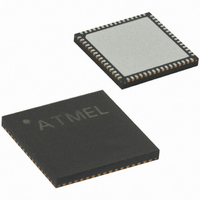ATMEGA645-16MU Atmel, ATMEGA645-16MU Datasheet - Page 31

ATMEGA645-16MU
Manufacturer Part Number
ATMEGA645-16MU
Description
IC AVR MCU FLASH 64K 64-QFN
Manufacturer
Atmel
Series
AVR® ATmegar
Datasheet
1.ATMEGA325-16MU.pdf
(362 pages)
Specifications of ATMEGA645-16MU
Core Processor
AVR
Core Size
8-Bit
Speed
16MHz
Connectivity
SPI, UART/USART, USI
Peripherals
Brown-out Detect/Reset, POR, PWM, WDT
Number Of I /o
53
Program Memory Size
64KB (32K x 16)
Program Memory Type
FLASH
Eeprom Size
2K x 8
Ram Size
4K x 8
Voltage - Supply (vcc/vdd)
2.7 V ~ 5.5 V
Data Converters
A/D 8x10b
Oscillator Type
Internal
Operating Temperature
-40°C ~ 85°C
Package / Case
64-MLF®, 64-QFN
Processor Series
ATMEGA64x
Core
AVR8
Data Bus Width
8 bit
Data Ram Size
4 KB
Interface Type
SPI, UART, USI
Maximum Clock Frequency
16 MHz
Number Of Programmable I/os
54
Number Of Timers
3
Operating Supply Voltage
2.7 V to 5.5 V
Maximum Operating Temperature
+ 85 C
Mounting Style
SMD/SMT
3rd Party Development Tools
EWAVR, EWAVR-BL
Development Tools By Supplier
ATAVRDRAGON, ATSTK500, ATSTK600, ATAVRISP2, ATAVRONEKIT
Minimum Operating Temperature
- 40 C
On-chip Adc
10 bit, 8 Channel
Package
64MLF EP
Device Core
AVR
Family Name
ATmega
Maximum Speed
16 MHz
For Use With
ATSTK600-TQFP64 - STK600 SOCKET/ADAPTER 64-TQFP770-1007 - ISP 4PORT ATMEL AVR MCU SPI/JTAGATAVRISP2 - PROGRAMMER AVR IN SYSTEM
Lead Free Status / RoHS Status
Lead free / RoHS Compliant
Available stocks
Company
Part Number
Manufacturer
Quantity
Price
Company:
Part Number:
ATMEGA645-16MU
Manufacturer:
ATECH
Quantity:
729
Part Number:
ATMEGA645-16MU
Manufacturer:
ATMEL/爱特梅尔
Quantity:
20 000
- Current page: 31 of 362
- Download datasheet (7Mb)
8.7
8.8
2570M–AVR–04/11
Clock Output Buffer
Timer/Counter Oscillator
Figure 8-3.
When this clock source is selected, start-up times are determined by the SUT Fuses as shown in
Table 8-10 on page
Table 8-10.
When applying an external clock, it is required to avoid sudden changes in the applied clock fre-
quency to ensure stable operation of the MCU. A variation in frequency of more than 2% from
one clock cycle to the next can lead to unpredictable behavior. It is required to ensure that the
MCU is kept in Reset during such changes in the clock frequency.
Note that the System Clock Prescaler can be used to implement run-time changes of the internal
clock frequency while still ensuring stable operation. Refer to
32
When the CKOUT Fuse is programmed, the system Clock will be output on CLKO. This mode is
suitable when the chip clock is used to drive other circuits on the system. The clock will be out-
put also during reset and the normal operation of I/O pin will be overridden when the fuse is
programmed. Any clock source, including internal RC Oscillator, can be selected when CLKO
serves as clock output. If the System Clock Prescaler is used, it is the divided system clock that
is output when the CKOUT Fuse is programmed.
Atmel ATmega325/3250/645/6450 share the Timer/Counter Oscillator Pins (TOSC1 and
TOSC2) with XTAL1 and XTAL2. This means that the Timer/Counter Oscillator can only be used
when the calibrated internal RC Oscillator is selected as system clock source. The Oscillator is
optimized for use with a 32.768kHz watch crystal. See
connection.
SUT1..0
for details.
00
01
10
11
Start-up Time from Power-
down and Power-save
External Clock Drive Configuration
Start-up Times for the External Clock Selection
31.
6 CK
6 CK
6 CK
EXTERNAL
SIGNAL
CLOCK
NC
Additional Delay from
Reset (V
Reserved
ATmega325/3250/645/6450
14CK + 4.1ms
14CK + 65ms
14CK
CC
= 5.0V)
XTAL2
XTAL1
GND
Figure 8-2 on page 28
“System Clock Prescaler” on page
BOD enabled
Fast rising power
Recommended Usage
Slowly rising power
for crystal
31
Related parts for ATMEGA645-16MU
Image
Part Number
Description
Manufacturer
Datasheet
Request
R

Part Number:
Description:
Manufacturer:
Atmel Corporation
Datasheet:

Part Number:
Description:
IC AVR MCU FLASH 64K 64TQFP
Manufacturer:
Atmel
Datasheet:

Part Number:
Description:
IC AVR MCU FLASH 64K 5V 64TQFP
Manufacturer:
Atmel
Datasheet:

Part Number:
Description:
MCU AVR 64KB FLASH 16MHZ 64TQFP
Manufacturer:
Atmel
Datasheet:

Part Number:
Description:
MCU AVR 64KB FLASH 16MHZ 64QFN
Manufacturer:
Atmel
Datasheet:

Part Number:
Description:
IC AVR MCU FLASH 64K 5V 64QFN
Manufacturer:
Atmel
Datasheet:

Part Number:
Description:
Manufacturer:
Atmel Corporation
Datasheet:

Part Number:
Description:
Manufacturer:
ATMEL Corporation
Datasheet:

Part Number:
Description:
Manufacturer:
ATMEL Corporation
Datasheet:

Part Number:
Description:
IC AVR MCU 64K 16MHZ 5V 64TQFP
Manufacturer:
Atmel
Datasheet:

Part Number:
Description:
IC AVR MCU 64K 16MHZ 5V 64-QFN
Manufacturer:
Atmel
Datasheet:

Part Number:
Description:
IC AVR MCU 64K 16MHZ COM 64-TQFP
Manufacturer:
Atmel
Datasheet:

Part Number:
Description:
IC AVR MCU 64K 16MHZ IND 64-TQFP
Manufacturer:
Atmel
Datasheet:

Part Number:
Description:
IC AVR MCU 64K 16MHZ COM 64-QFN
Manufacturer:
Atmel
Datasheet:











